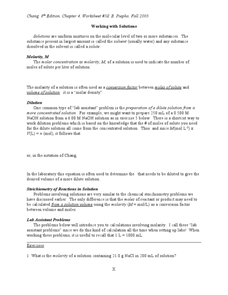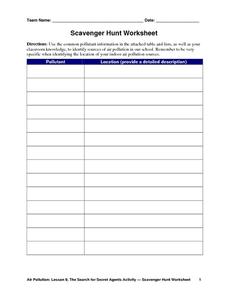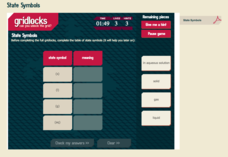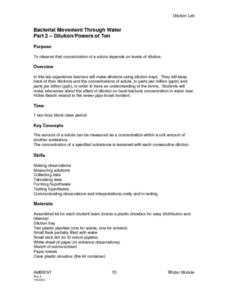Curated OER
Solubility
Fifth graders determine the difference between a soluble and an insoluble solution and how to increase solubility. They make a saturated solution using solvents at different temperatures.
Curated OER
Mixtures and Solutions Activities
In this mixtures learning exercise, students access an activity on the web and record their answers from the web activity into a graphic organizer. Then students complete 2 short answer questions.
Curated OER
Tasty Solution
Students examine the difference between a solvent, solute and solution. In this solutions lesson students complete an experiment and observe what happens when a solution is stirred.
Curated OER
Solvents
In this solvents pre-lab worksheet, students describe the difference between a polar and non-polar solvent and also the dangers associated with hexanes and iodine. This worksheet has 12 short answer questions.
Curated OER
Working with Solutions
In this solutions worksheet, students review how molarity is calculated and how to prepare a dilute solution. This worksheet has 5 problems to solve.
Curated OER
Solutions Quiz Review Sheet
In this solutions activity, students use a phase diagram to determine the boiling point and molality of the solution. Students determine the electrical conductivity of a saturated solution. This activity has nine problems to solve.
Curated OER
Semipermeable Membranes and Bioaccumulation
Beginning biologists place a drop of food coloring into water of differing temperatures to observe the effect on the diffusion rate. They remove the shells from raw eggs and then experiment with osmosis over the remaining membranes....
Curated OER
Scavenger Hunt Worksheet
Exactly how environmentally friendly is your school? From the air fresheners in the bathrooms to the cleaning solvents used in the classrooms, young conservationists search the school grounds for sources of air pollution in...
American Chemical Society
Dissolving and Back Again
From solid to liquid and then back again. Young scientists dissolve salt in water and then evaporate the water while observing what happens to the solute. They use their observations to make predictions about other solutions.
Royal Society of Chemistry
State Symbols
When water is a solvent in a chemical equation, we consider it an aqueous solution. Scholars match the name of four states of matter to their proper symbol in a chemical equation. Four puzzles provide repetition to help pupils remember...
Curated OER
Solutions Worksheet
Students complete a worksheet on solutes in chemistry. They are given an equation in order to find the total mass solution, molarity, and molality.
Curated OER
Dilutions Worksheet
In this dilution activity, students determine the final concentrations of solutions after a specific amount of water has been added. This activity has 4 problems to solve.
Curated OER
Bacterial Movement Through Water Part 2- Dilution/Powers of Ten
Students make dilutions using dulution trays. They keep track of their dilutions and the concentrations of solute, to parts per million (ppm) and parts per billion (ppb), in order to have an comprehension of the terms. Students make...
Curated OER
Osmosis
In this biology worksheet, students determine how many solvent and solute molecules there are in the red blood cell and the IV fluid. Then they determine whether the IV fluid is hypertonic, hypotonic, or isotonic to the red blood cell.
Curated OER
More on Temperature and Solubility
Learners discover how temperature effects the solubility of solutes by experimenting with a range of temperatures. They develop skills for observing, inferring, measuring, comparing and contrasting.
Curated OER
Determining pH
Students evaluate pH levels through a solubility experiment. In this pH levels lesson, students list characteristics of acids and bases. Students complete their own pH level experiment. Students go to the GEMS Alien Juice Bar website to...
Curated OER
Mixtures
For this chemistry worksheet, students use the clues given at the bottom of the sheet to complete the crossword puzzle on mixtures. There are 18 clues to solve on the sheet.
Curated OER
Chemical Solutions
For this chemical solutions worksheet, Students determine the significance of the critical point in a phase diagram and rank solutions from weakest to strongest solute-solvent interaction. This worksheet has 4 problems to solve.
Chymist
The Solubility of a Salt in Water at Various Temperatures
An educational activity allows young chemists to test the solubility of different types of salt at various temperatures. Groups create a graph using data from unsaturated, saturated, and supersaturated solutions.
Curated OER
The Effect of Temperature on Solubility
In this solubility worksheet, students conduct an experiment to see how temperature effects the solubility of salt in water. Students record their data in a chart and then graph the results. Then students complete 2 short answer questions.
Curated OER
Solubility Lab
For this solubility worksheet, learners test a variety of polar and non polar substances to determine which ones will dissolve in vegetable oil and which ones will dissolve in water. Students collect data and answer 2 questions about...
Curated OER
Thin Layer Chromatography (TLC)
Learners study flavinoids and how they exist in the plant kingdom. In this pigment lesson students complete a lab activity to see how flavinoids move in substances then record their observations.
Curated OER
Chemical Bonding and Shapes of Molecules
In this chemical bonds worksheet, students review the different types of bonds, Lewis dot structures, ions, and molecule shapes. This worksheet has 10 matching, 17 multiple choice, and 3 drawing questions.
Curated OER
Molecular Movement in Water Part 1- Diffusion
Young scholars obseve and compare molecular movement within water at various temperatures and of varying salinity. They discuss the movement of water on a larger scale which can affect the movement and concentrations of microbial...

























